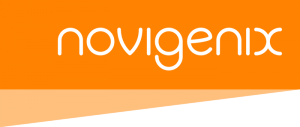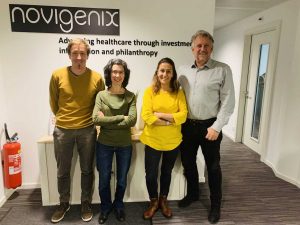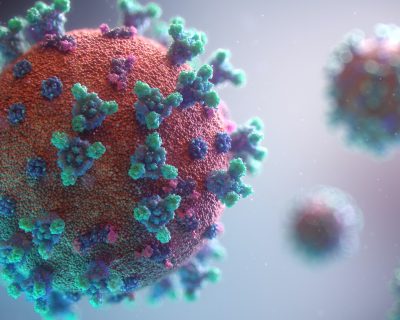Site
Select your branch
Innovator of the Month Interview with Novigenix
Innovator of the Month Interview by Davide Coda and Gian Franco Piredda.

Novigenix is an innovative Swiss molecular diagnostics company specialising in new generation blood tests for early detection of cancer and precision medicine. Founded in 2013, by a group of three scientists from École Polytechnique Fédérale de Lausanne (EPFL), the company is currently led by Dr. Jan Groen, who was appointed CEO in May 2019. The technology at the core of Novigenix is a blood immune-transcriptomic sequence platform which measures changes in the expression of genes that are being transcribed by peripheral blood immune cells. Through the application of artificial intelligence, Novigenix can identify distinct “signatures” for how the immune system as a whole is responding to a given tumour or disease condition. This information can later be used for cancer detection, disease progression and therapy selection.
Tell us more about immuno-transcriptomic sequencing and how the technology developed by Novigenix works?
Our company focus is oncology. There are two signals that can be used to detect the presence or absence of cancer: tumour-derived signals and immune-signals. The former is mostly represented by proteins and/or DNA/miRNA molecules released by the cancer into the bloodstream; the second one acts as the “police force” which promptly responds to dangerous events happening in our body. Immune-transcriptomic is all about the immune-signals. At Novigenix we look at the presence of specific white blood cells – monocytes and/or macrophages – during the early development of colon cancer. Our technology implies taking a blood sample from a healthy individual, isolating these white cells, and sequencing their mRNA molecules. Since we have previously identified which mRNA molecules are expressed by the white cells in the presence of cancer using an artificial intelligence algorithm, we are now able to discern whether the individual we took the blood sample from does or does not have colon cancer. At the moment, in the Swiss market, we are selling a product called Colox, which comprises the signature of 29 specific colon cancer genes that we have identified and turned into a RT-qPCR test, a technique used to measure the amount of a specific RNA.
Do you plan to apply your technology to the diagnosis of other types of cancer?
Every different stage and type of cancer comes with a specific immune-signal pattern. Our platform LITOseek – Liquid Immune Transcriptomic sequencing – can potentially cover types of cancer and different stages, such as melanomas, breast and bladder cancer. However, this newly developed platform has proven to perform significantly better than anything else on the market specifically when applied to early stage detection of colon cancer.
Do you think other types of biological samples could give you similar results, saliva for example?
Yes, saliva would indeed be the ideal specimen. Although blood sampling is generally perceived as a non-invasive procedure, some people consider it pretty scary. In addition, it also requires patients to go to hospital, and trained personnel need to collect your blood. For these reasons, saliva would be the best way forward, being less invasive and enabling home testing. However, the main drawback is that the quality and quantity of immune cells present in saliva is lower compared to blood. Nonetheless, we are currently working on the development of an extraction protocol in order to collect enough mRNA from the immune cells present in saliva. Once we have optimised an extraction protocol, we will focus on this solution to come up with a valuable product to bring to market.
I guess you work with big and personal data, how are you handling data-security issues?
In all cases, patients are the owners of their data and they can agree to provide it to the company under the umbrella of an informed consent form. We store the data in an anonymized way, and we only keep records of some basic information such as clinical symptoms, age and gender. At any time, the patient can have their data back or ask for their data to be destroyed. Interestingly, we recently did a small market survey and we learnt that most healthy individuals and patients are very willing to donate their data, which is great news from a research perspective!
Which market segments are you addressing?
Our company is focusing on colon cancer, which is a very big market. Screening for colon cancer is a hot topic, both in Europe and the US. The most widely used test at the moment is a stool-based test. Obviously, it is a very cheap test, but it’s not very sensitive or specific. Any other test like a blood test will be much more sensitive, but will most likely be more expensive. In Europe, the problem you face when you want to introduce a new screening test on the market is that you have to convince the government of each country within the European Union to do that. From a government perspective, a new test means a big upfront investment, and it takes many years to measure the overall cost reduction for the healthcare system. At the moment, we are selling Colox in Switzerland via Unilabs that offers it to their customers, but the ultimate goal would be to sell it directly to hospitals, government institutions and large commercial labs. Most hospitals labs have sequencing capabilities in house and they know how to extract mRNA from blood cells. We will eventually provide them with a completely validated workflow.
What is the goal of your company over the next 5 years?
We have three main goals to achieve. First, we are in the process of validating our LITOseek platform for patients with colon and other types of cancer; once this step is done we plan to expand from detection to the monitoring of patients being treated for cancer. For this specific goal, we have recently signed an agreement with a medical centre in the Netherlands. Our second goal is to work on neuroendocrine cancers in collaboration with the pharma company RadioMedix, with whom we also signed an agreement. The third goal, as said before, is to look at what can we do with saliva samples from an R&D point of view.
Can you tell us more about your team?
We are a very small team. This is related to the fact that we don’t manufacture anything; we are more like a highly sophisticated R&D group with a very strong medical team. Today we have about 10 people in the company, mostly split between R&D, regulatory and finance teams. At the moment we don’t have a commercial team, as we delegate such tasks to third parties.

How has your personal experience been so far leading Novigenix over the past 7 months? Do you need to have a detailed scientific background?
I have been CEO of several companies in my career, and three of them were developing diagnostic products in oncology. I moved from the US to Switzerland to work for Novigenix, because of their unique technology: I think immune-transcriptome is quite intriguing, and because of the attractiveness from a commercial perspective, no one outside academia is doing something similar to us. I believe these types of small biotech companies (i.e. science based) really need a CEO with a strong scientific background: e.g. if you are a CEO with a financial background you will need to surround yourself with lots of people to aid your understanding of the technology and support with decision-making. Instead, it is much easier to have a good knowledge of your company’s main product and hire experts in accounting to help you run the company. Indeed, I’m not an oncologist myself, I’m a medical microbiologist, but at the end of the day whether it’s viruses or cancer cells we’re talking about, it’s all about RNA and DNA!
Do you have any suggestions for students interested in developing their own ideas?
Dedication! There are lots of programs available today to get you started and for a start-up finding seed funds is not a problem, but my advice would be to first test the market by talking to lots of people to see if your idea is a valuable one. Ask them if there truly is a market and if they see the value of your idea, before taking it to the next phase. Then, once you have leveraged your idea, it is important to form a group of believers around you; people that are dedicated and focused. Whatever it is that you’re developing, end users should see the value in it, and in the case of therapeutic or diagnostic applications end users are doctors or patients. If they don’t see the value of your idea, you will never commercialise it successfully!


